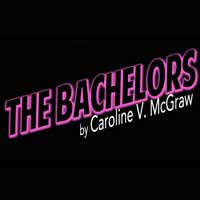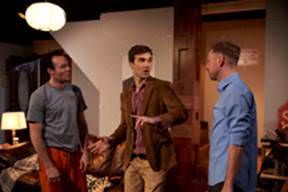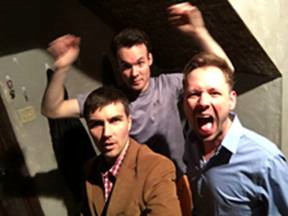The Bachelors
By Caroline V. McGraw
Directed by Erica Weiss
Produced by Cole Theatre
At The Greenhouse Theatre, Chicago
One Half of a Good Black Comedy
Tha bros: bachelors who lead ostensibly superficial, booze-fueled lives filled with sex and partying. This is the class of men that is the subject of Caroline V. McGraw’s The Bachelors; and in one 75-minute Act her play attempts to lead them to confront the emptiness of their trivialized lives and, perhaps, even to penetrate their one-dimensional personas and discover what really lurks in the unsearched darkness of their psyches.

It all starts when—well, there’s the problem: “it” all starts before we arrive, before the actors take the stage, before the first line of dialogue is spoken—“it” all starts in the Act before this One Act. What we, the audience, see is, in actuality, the “morning after,” the “walk of shame,” where the hung-over conscience relives last night’s mistakes accompanied by the hindsight of a voiceover lecture. Nevertheless—
It all starts when Bachelor #1, Laurie (Shane Kenyon), arrives home early from his business trip to find Bachelor #2, Kevlar (Nicholas Bailey), passed out on the carpet of their apartment. Upon awaking, Kevlar immediately begins rambling about how his girlfriend, Danielle (a.k.a. “jizz mop”), has ovarian cancer and, in effect, has broken up with him in order to dedicate her remaining, pre-mortem vitality to sleeping with as many men as possible—a dubiously moral though perhaps not unreasonable undertaking that, we might consider, is not entirely different than the practices of—Bachelor #3, Henry (Boyd Harris), whose insouciant arrogance (and inexplicable dance sequence) punctuates the rising, rising, rising action of the story (a whole lot of soul-searching) until—following two bizarre revelations, two story-time monologues, and a vague climax—the play finally abruptly and unsatisfyingly ends.

The Bachelors has a great premise. It has (when not trying to be funny) believable dialogue. And it has well-drawn characters—who, in this production, find impressive talent to bring them to life. But I think there is something in the fact that I found the vilest and most inexplicable character, Boyd Harris’ Henry, to be the most fascinating one of the three; and I think the answer to why this is lies in the same direction as why I found the ending to be so unsatisfying (though intriguing) and the other two bachelors to be rather one-dimensional and bland.
The Bachelors may be a character(s) study, but characters, like plots, live in action—what they do, what happens. Here, we see Kevlar whine, curse, moan, or otherwise make some comedic, obtuse comment. We see Laurie get into a fight with Henry to help a girl (or, “woman”), clean up some vomit, consistently police his friends’ misogynistic language, tell a story about what he did do, and, finally, commit himself verbally to a future betrayal of his friendship with Kevlar. Effectively, Kevlar does nothing on the stage to add any dimension to his characters, and all of Laurie’s actions are repetitious and do little to advance his character’s story. For the most part, all they did or will do is not shown but merely told: an opportunity for Kenyon to shine for seven minutes in a well-acted monologue, but, dramatically—uninteresting.
Henry, on the other hand, does quite a bit. Though his character—like Kevlar’s and, really, Laurie’s—is static throughout the play, we see him lie, fight Laurie to protect himself, encourage (and drug) Kevlar to forget his woes, dance (for five long minutes) in a japing and provocative manner, and lie some more. In other words, while McGraw has her other two bachelors expose themselves (mostly) through verbal diarrhea (sometimes, literally, vomit), she has Henry consistently expose his character through his concealment, in the lies of his dialogue and the inanity of his actions. That is an interesting character—so interesting, in fact, that I think the production’s worth seeing just to see Boyd’s performance.
However, Henry is not our protagonist, Laurie is, and the conclusion of this play is so unfulfilling and flat because the crux of Laurie’s depth as a bachelor and the whole arc of his story depend on what he did the night before. In other words, The Bachelors is the Second Act of potentially affecting play, but, without the other half, it’s only a 75-minute—excuse the “bro-spression”—cocktease of monologues and sexual vulgarity that amount to little more than a few laughs.
If you’re looking for a play to see with spot-on scenic design (by Grant Sabin) and some impressive and entertaining acting, then Cole Theatre’s The Bachelors, directed by Erica Weiss, is your show. But be prepared to feel perplexed at the strange momentum of the play (that’s the inciting incident that never happens) and unsatisfied at the conclusion—because, again, the whole story began the night before. Aw, bro, we should’a been there!
Somewhat Recommended
August Lysy
Reviewed on 20 March 2016
For more info checkout The Bachelor page at theatreinchicago.com
Playing at the The Greenhouse Theatre, 2257 N. Lincoln Ave., Chicago. Tickets are $10 – $24.
